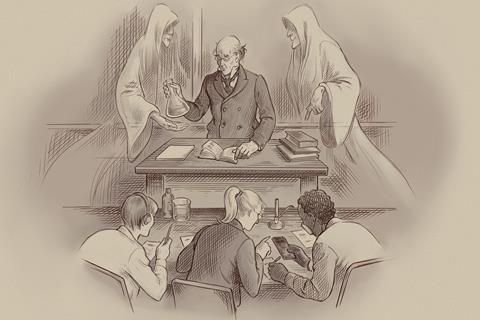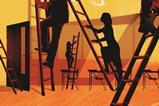Deputy head Phil Naylor talks plainly about the reality of schools in challenging circumstances and describes what help they need and from who

Some schools are harder than others. While all teachers have been dealing with pandemic-induced difficulties over the past two years, some have been doing it in very difficult, and much harder contexts. The pressures on schools in challenging circumstances have been exacerbated post-pandemic and the widely entrenched disparities augmented by absence, recruitment, retention and inspection.
Now, what I want is Facts. Teach these boys and girls nothing but Facts. Facts alone are wanted in life. Plant nothing else, and root out everything else
Hard Times by Charles Dickens
Here’s my focus on the facts:
- Schools with more pupils from deprived backgrounds are less likely to be judged ‘good’ by Ofsted.
- Schools in challenging circumstances are likely to be more affected by a new teacher supply challenge.
- These schools have been the worst affected by staff absence over the pandemic.
What I want is facts
In Dickens’ Hard Times, a focus on the facts is what is required. Here’s my focus on the facts:
- Schools with more pupils from deprived backgrounds are less likely to be judged ‘good’ by Ofsted (bit.ly/3nIMkup).
- Schools in challenging circumstances are likely to be more affected by a new teacher supply challenge (bit.ly/3nEA9Pi).
- These schools have been the worst affected by staff absence over the pandemic (bit.ly/3P4KEaz).
The lived reality of these pressures results in an insular, protective culture. The demands of the here and now take precedence over the loftier and more noble aims of education. In theory, supportive professional environments improve the effectiveness of teachers and the outcomes of students. In practice, when there are not enough staff to cover classes, it’s difficult to achieve.
The lived reality of these pressures results in an insular, protective culture. The demands of the here and now take precedence over the loftier and more noble aims of education. In theory, supportive professional environments improve the effectiveness of teachers and the outcomes of students, according to the Education Evaluation and Policy Analysis journal (bit.ly/3yEcBQR). In practice, when there are not enough staff to cover classes, it’s difficult to achieve.
There is a great deal of support provided for schools in these circumstances. DfE, MATs, local authorities, subject associations and the Chartered College of Teaching have done a huge amount to reprofessionalise and develop teachers and support students. The challenge for school leaders is to select the best initiatives for their teachers in their contexts while allowing the schools to continue to function effectively.
Ah, rather overdone, M’Choakumchild. If he had only learnt a little less, how infinitely better he might have taught much more!
Hard Times by Charles Dickens
Taught much more
Successful programmes such as the early career framework and national professional qualifications have shown the value of allowing teachers to develop knowledge, skills, wisdom and networks with peers and experts. Experiencing life beyond the classroom, they return to the classroom reinvigorated and inspired. Teachers imbued with knowledge and practice, free from the attrition of trial and error, are consequently more effective for their students. Ofsted’s Education inspection framework paper (pdf) found that teachers who rate their own subject knowledge more highly show higher levels of effective teaching behaviours and better pupil outcomes.
Successful programmes such as the early career framework and national professional qualifications have shown the value of allowing teachers to develop knowledge, skills, wisdom and networks with peers and experts. Experiencing life beyond the classroom, they return to the classroom reinvigorated and inspired. Teachers imbued with knowledge and practice, free from the attrition of trial and error, are consequently more effective for their students. Ofsted’s Education inspection framework paper (pdf: bit.ly/3Aq4RDr) found that teachers who rate their own subject knowledge more highly show higher levels of effective teaching behaviours and better pupil outcomes..
Initiatives targeted at schools in challenging circumstances that aim to improve teachers’ content knowledge, pedagogical knowledge, and pedagogical content knowledge are required urgently. The focus on the curriculum as the impetus for school improvement with middle leaders driving that change has placed a huge responsibility on subject leaders.
What schools in challenging circumstances need are easy to access, attractive, social and timely initiatives fulfilling their knowledge requirements. Subject associations are perfectly placed to co-construct and deliver these initiatives.
How to make schools want to take part
Easy
Make the approach to schools targeted and of clear benefit. Host CPD sessions weekly after school on developing subject knowledge for non-specialists on GCSE physics. Online workshops to develop pedagogical content knowledge for early career teachers are low-cost and high impact. Provide staff training resources and online support.
Attractive
Subject associations can help widen the horizons of pupils and teachers. Trips to universities, science workshops and visits can hook in schools. Large sessions including whole year groups can assist with logistics and cover issues.
Social
Working with whole departments and across school can increase engagement. Funding for staff time with clear requirements, financial sanctions and attendance expectations can be effective.
Timely
Reduce the need for multiple staff members to be out of school on the same day at conferences by fitting initiatives in with the rhythm of the school day and year. Use summer term as a key driver of school improvement rather than waiting for the new school year.
Some schools are harder than others and these are the schools in which everyone reading this article should work at some point in their career. These schools contain the most dedicated, inspirational and committed staff. They are far from the utilitarian drudges of Dickens, but having been battered by the difficulties of the last two years, our outlook can be practical rather than attractive. There is a clear role for subject associations and other stakeholders in supplementing our knowledge, augmenting our experiences and reigniting our passion for this most wonderful profession.
Inspired to find out how the RSC can help you and your school?
The Royal Society of Chemistry Education team offers professional development in a variety of ways, both in-person and online. Teach Chemistry members can also access the Elevating Chemistry programme for help.
Not a Teach Chemistry member? Sign up today. It’s free and quick to do.













No comments yet